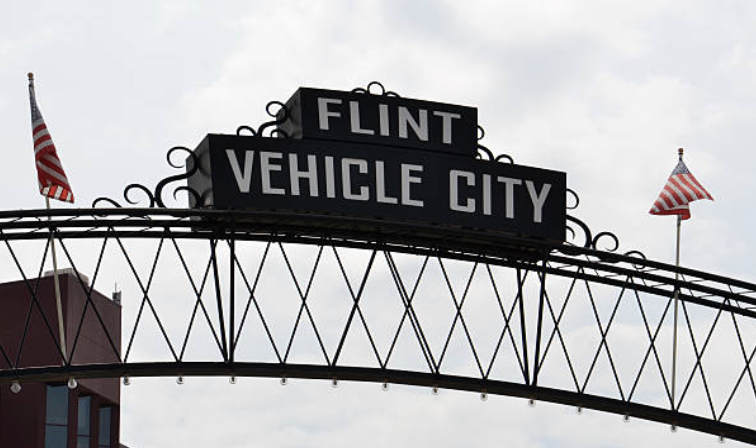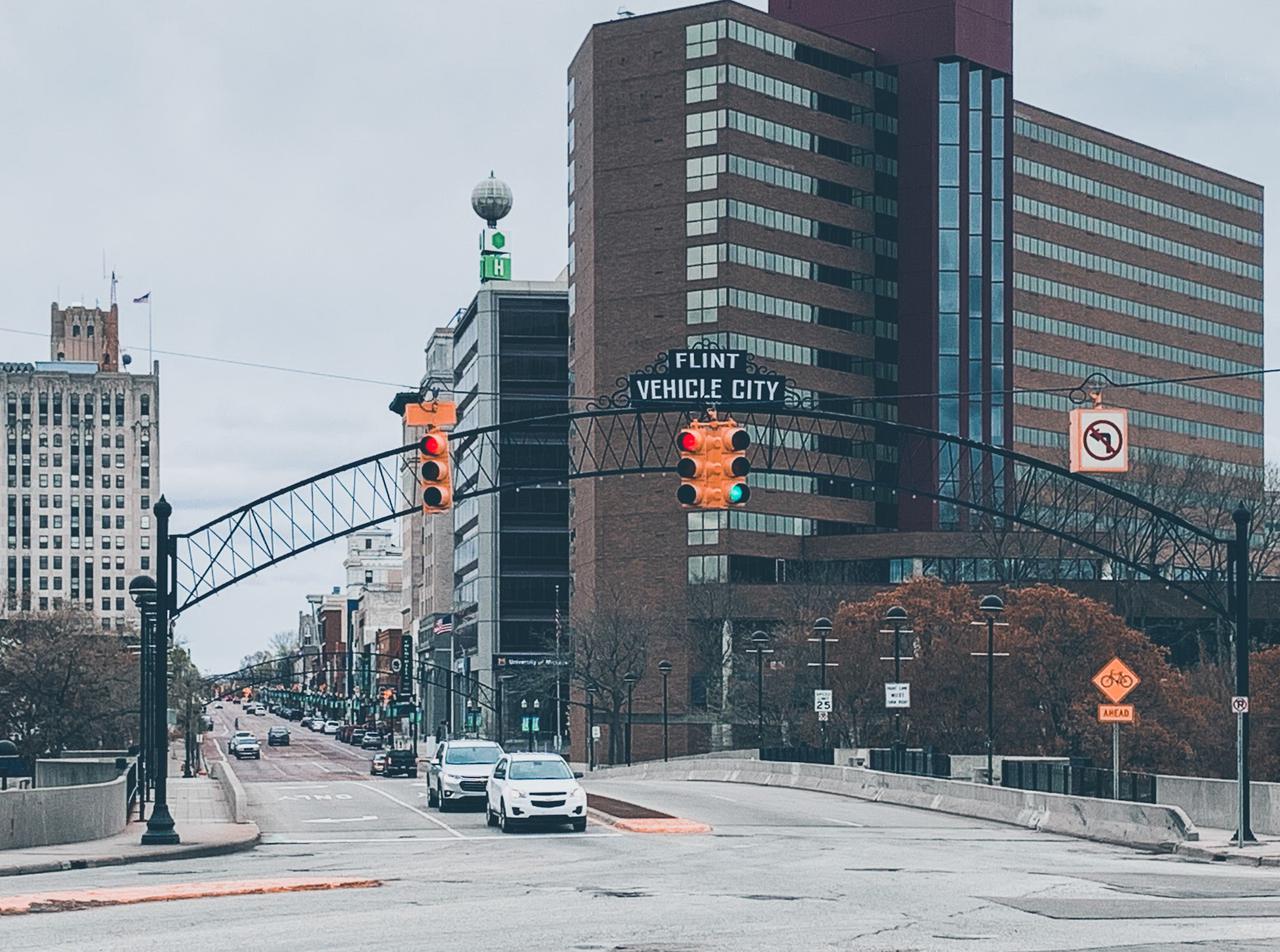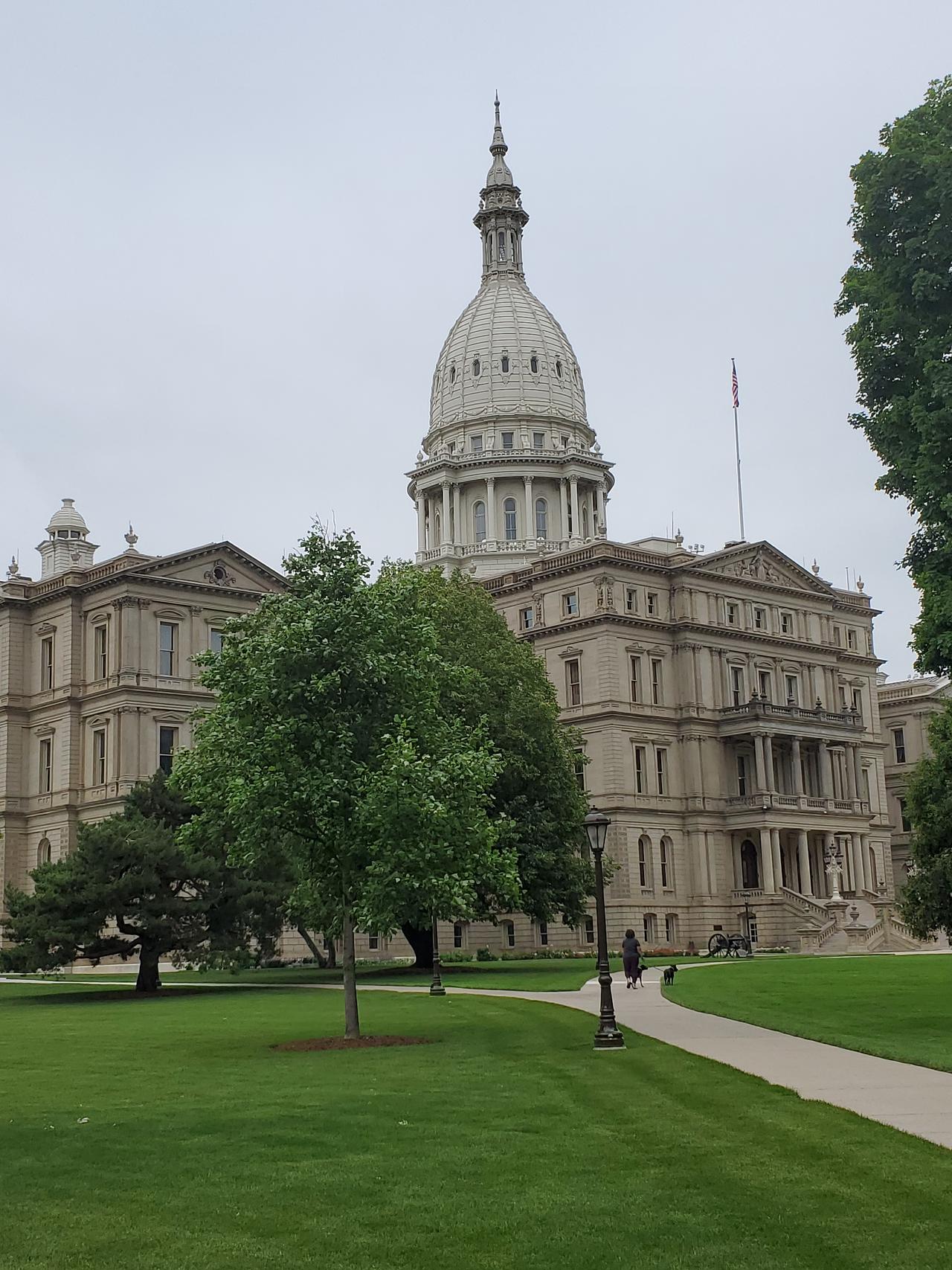March 25, 2021
The Flint Water Crisis: Can It Happen Anywhere?

We make our history. It is a good thing that history is recorded. Written history has a good purpose.
Today, journalists, documentarians, and courtroom stenographers record Flint, Michigan's environmental history. It is of no consequence that the powerful in Michigan's government does not like history as written. Historians record the actions of the faint of heart as well as the actions of criminals. History does not lie about the small things. History shines a light on the good and beautiful. It also shines a light on evil, selfishness, and greed.
Much has been written and said about Flint's water crisis. There has been an avalanche of television news stories and newspaper articles reporting about the crisis. Professional reporters are earnestly seeking the truth. We seek to understand what went wrong, how to correct the problems, and who to hold accountable.

Welcome to Flint!
At this point in the Flint water crisis, authors have published several books about various aspects of the crisis. These books can help us understand what happened, who did what, and what needs to be fixed. Unlike the Bible, no one book seems to have all the encompassing answers to life's tangled messes. It is vital to seek out researchers who can tell the story about the poisoned city.
It will take several books to understand the ins and outs of the Flint water crisis because it is an enormously complex event with long-term implications for the people of Flint and Genesee County. Please note that no person has or will write a book that paints the whole picture because that would be a vast and challenging project.

To this end, the Radio Free Flint spoke to acclaimed author and writer Anna Leigh Clark, who lives in Detroit and hails from St. Joseph, Michigan. She is currently a reporter for Pro Publica, a nonprofit newsroom dedicated to investigative journalism with a moral force. She is also the author of The Poisoned City: Flint's Water in the American Urban Tragedy. Anna's book, published in July 2018, has received numerous awards, including the Hillman Prize for book journalism. It was also named one of the year's best books by the Washington Post, San Francisco Chronicle, the New York Public Library, audible, and others.
The Poisoning of an American City
I asked Anna to explain the thesis of her book about Flint, and she replied:
"I want the book to make it plain that what happened, first of all, was a story of profound environmental injustice, and the erosion of democratic and human rights. And I want to set that in context with the broader history of infrastructure inequality in the city, which hinges on the way that we built our cities in separate and unequal ways. And we did it all on purpose, the consequences of that are still playing out today. So, this is certainly a story about Flint, but it is also this broader, difficult relationship that I think this country has with its cities, which is why we see a pattern of these like hollowed out urban cores surrounded by more prosperous, relatively more prosperous suburbs."
The Flint water crisis is an unnatural crisis. It is also a manufactured crisis for which several government officials have been charged with crimes. A jury will decide in Flint courtrooms to what extent the water crisis was manufactured. In doing so, a jury will be required to determine whether there was sufficient mens rea or criminal intent to commit the serious crimes for which they are charged. One of those crimes is manslaughter.

Anna Clark: The Flint Water Crisis Was An Unnatural Man-Made Disaster
In Anna Clark's view, the Flint water crisis was a collection of decisions by governmental officials that collectively constituted a "man-made disaster."
Anna Clark elaborated:
"All of that was man made. It did not have to happen. It was choices, people were making choices, both concerted choices and defacto choices, born out of neglect. And I also mean, it's an unnatural crisis and the larger history of why the city was in such a precarious and vulnerable position in the first place."
In Flint, the negative portrayal of the city in the national and international media has long been a sore spot for residents and Chamber of Commerce types. Residents in the City of Flint have great pride in the history of Flint. Indeed, Flint has much to be rightfully proud about. Likewise, Flint has some things that it should not be proud of, such as its dreadful and persistent violent crime rate, shocking infant mortality and poverty rates, and Flint's modern history of racial division, segregation, and inequality. All of which deserve media attention and scorn. At the same time, history has proved the City of Flint has been a world leader in automotive manufacturing, community education, and ceramics technology. It has a long and storied history of being the birthplace of General Motors, at one time one of the world's most powerful corporations.

In 1989, Michael Moore Pulled the Fire Alarm, Giving Notice of Impending Hardship
In 1989, filmmaker Michael Moore's "Roger & Me" portrayed the Flint community as a place of hardship and impending decline. He proved that by showing wrecking balls knocking down part of GM's iconic Fisher Body #1 factory. He interviewed people who were devastated by the incompetent leadership of General Motors. His reward was scorn and critical derision for his portrayal of Flint. Michael Moore has never been a guest speaker at the prestigious Rotary Club of Flint, even though he has produced several of the most viewed documentary movies in the history of film!
Is Poisoning What Happened to Flint?
It was my opinion when Anna Clark's book "The Poisoned City" came along; it seemed evident from the very title of her book that she would get the "Michael Moore" treatment from city and state leaders. It was inevitable that any truth-telling about the inglorious parts of the greater Flint community and its racial and economic problems would not be met with adoration. Ignoring the ugly truth has just been part of the deeply ingrained culture of my famed hometown. That has been the case whether journalists and filmmakers explore and prove with hard cold facts the reasons for thousands of people losing high-paying jobs or whether the community has been ranked as one of the most segregated places in the nation!
Not to ignore that obvious question of Clark's provocative book title, I asked her where it came from and why she chose to use that title. Her reply went right to the heart of those epic criminal cases against the former Governor of Michigan, Rick Snyder, and several others in his administration. Anna Leigh Clark's reply and our exchange were like a Tom Brady laser touchdown pass to the endzone at Ford Field in Detroit:
Anna Clark:
"Now, it is interesting you say that, because I did originally have a different title in my working version, I proposed at the start at it (the proposed book title') something from Toni Morrison, the title I had was, Water's Perfect Memory. All water has a perfect memory. It is always trying to get back to where it was, which I felt was evocative in many ways of this story.
The point is, I like that the word evokes the different kinds of toxic consequences that happened from this. And it also puts a little bit of weight on the fact that it was caused by actual actions and did not just happen. There were actual choices that people made."
Arthur Busch: So, when we think of the word poison, we think of somebody; I think about it as a lawyer, as a prosecutor, if somebody poisoned somebody, I need to show they did it purposefully with some intention, it was not an accident. I guess that is why you asked the question. This was not an accident; it is the book's thesis.
Anna Leigh Clark: Many of these questions are being debated in courtrooms about the level of intention and awareness. There were many opportunities for this not to be as bad as it was, right? Like there are all these choices, there's a choice to have this emergency manager with a limited amount of accountability, there is a choice to not build out the city water plant with the staffing and resources that it would need to treat a more complex water source properly, there was a choice to leave Detroit's water system at all, there was another choice to, do this weird little temporary switch in the first place, which no other future customer of KWA did. That is all just in the lead-up to this, and there is a choice not to treat the water with corrosion control, despite that being a violation of federal law. And then, as things continued, as the problems progressed as to people, there was a choice to ignore people's complaints. There is a choice to dismiss the fact that the water was corroding GM's engine plants so severely that they needed to leave and hook on to a suburban water source."
Rachel Maddow, Cable TV Host, Aimed the Disinfecting Lights of Truth on Flint
Journalists such as MSNBC's Rachel Maddow first brought the bright lights of cable television news coverage to the Flint water crisis with an influential report about the facts. Maddow set in motion a cascade of media coverage that perhaps turned the corner for the residents of Flint. The world was shown the plight of an important American city in deep trouble and its people "poisoned." In 1989, the film Roger & Me also pointed out the dire and catastrophic consequences of the impending implosion of the domestic automobile industry (remember, the auto industry afterward ended up bankrupt).
I doubt that Rachel Maddow had Governor Rick Snyder's State Police or private investigators tail her around looking for dirt on her finances and personal life like General Motors did to Michael Moore nearly three decades earlier.
The Flint Water Crisis is a Parable for America About Moral Leadership
Flint, Michigan, has spent too much energy hiding and covering up its social, economic, and infrastructure problems. It certainly is not the only city in America to do so.
What impresses me so much about journalist Anna Clark was her stated motivations for telling Flint's whole "story," not just the water "story." The "story" Clark was referring to and the evening news reports are not synonymous. Clark told me:
"I wanted an opportunity to be able to tell a story about what happened there that in context of broader, complicated, separate unequal story about cities, and I wanted to do it in a way that had some history and some nuance therefore I appreciated the opportunity to do a book even when I did some long articles."
Sharing Flint's water crisis story in a granular fashion to the outside world falls short unless this crisis is seen as a parable. A parable is a short story that teaches a moral or spiritual lesson. The Flint water crisis has a shocking degree of indifference by the government and its leaders to the health and welfare of those they are responsible for protecting. Whether a jury finds any of those people guilty is necessary to share the fact of moral failures by governmental officials. There was a moral failure in leadership in the days and years leading up to the Flint water crisis, and the world needs to know about it. Flint can never change until those elements who brought such catastrophic illness and death to the historic city are removed from ever making life and death decisions again.
The Flint parable has value to all American cities, especially those where globalization has passed by.
It does a great disservice to the public if the storyline of Flint, Michigan is, "the water crisis is a rare "one-off" event, happening in a sad sack town, that found itself in a horrible humanitarian crisis with poisoned water, with a bumbling and incompetent government."

Can this Poisoning Happen Anywhere?
The implications for other communities seem to beg the question; how low are your town's standards for moral and legal responsibility for those who would seek and accept public leadership? The critical path to a safe future is ensuring that those in public service see the job as more than a pension plan and health benefits. Instead, it is "public service." That concept has somewhere been lost in our modern-day high-tech society. Politicians would set the bar of responsibility low. This talk gets in the way of a lobbying career when it comes to moral responsibility.
In my interview with Anna Clark, she said;
"I do think people, some people have mistakenly thought that if their community isn't Flint, or doesn't look like Flint, then they're immune from a lot of what Flint faced. That is not the right way to view that either. We have decaying infrastructure, segregation, concentrated poverty, a lot of these things are problems everywhere that we all must reckon with. And if people interpret that as a Flint story, as a parable, that helps them awaken people to the issues in their own communities. Great!"
Flint Cover-Up Culture Needs Fixing
A key ingredient to the Flint story has been a culture that cannot recognize and address severe issues until it is too late. The infrastructure of Flint, Michigan, like many other places, is rotted and substandard. It is the infrastructure itself that poses grave risks to the safety and health of the public. Flint, Michigan, has ignored its infrastructure for so long that its system, at one point, recently lost about one-third of its water through broken water mains and pipes! Think of a road you travel where the local government is too strapped to fix the potholes, the dips and shoulders of roads disappearing. That road without repair can threaten the loss of life to an unsuspecting motorist. A legionella-laced water system poses a threat to the health of tens of thousands of people. Author Anna Clark, who has researched and reported on infrastructure issues, noted that bad water is not always determined by where you live:
"First of all, like we have aging infrastructure all over this country, including in wealthier, more privileged, whiter communities. We have lead pipes everywhere and lead plumbing and despite it being one of the world's best-known neurotoxins, and we've never really summoned the political will to seriously change that. But it just never rises to the top of, you would need the courage to like take it on, because it is expensive, because it might not even be what your voters care about."

The Block, Community Message Board Flint, Michigan
The residents of the Flint area must address confront community leadership (not just elected leaders, but the leadership of the business, professional and medical communities) who have a history of wanting to dismiss the moral lessons of each unimaginable crisis. The actions before the Flint water crisis were broadcast by Rachel Maddow on MSNBC, revealing a failure to listen with an open mind to the citizenry, especially those whose family members died or were poisoned and brain damaged. The citizens of Flint have questions about extreme capitalism and racial inequality. These issues, in the case of Flint, Michigan, have future consequences for the people's health, safety, and welfare.
Humanitarian issues confronting a healthy community take morally competent community leadership. In the real world, cities and towns with fair and just societies do not act indifferently to their citizens' sufferings, like in Flint, Michigan. Town boosters love to promote stories of justice and achievement. In Flint, Michigan, and towns and cities across the land, there is a need to adjust our moral compasses to prove America represents Equal Justice Under Law and that we value and cherish the lives of everyone no matter their race or economic status.
It's time to put an end to this madness.
It has been a long time since this tragedy visited the Flint area. Sharing with you an article that appeared on CNN website. I spent some time with the journalists to help make sure the retelling of the case was accurate.
It dawned on…
Fly Away Home Snowbird: Reflections on Fall in Michigan
Fly Away Home Snowbird
LISTEN TO PODCAST EPISODE
It's that time of year when the trumpeter swans disappear from our little northern Michigan lake. Our family has called the modest home on that lake "the cottage ." Lately, the Can…




